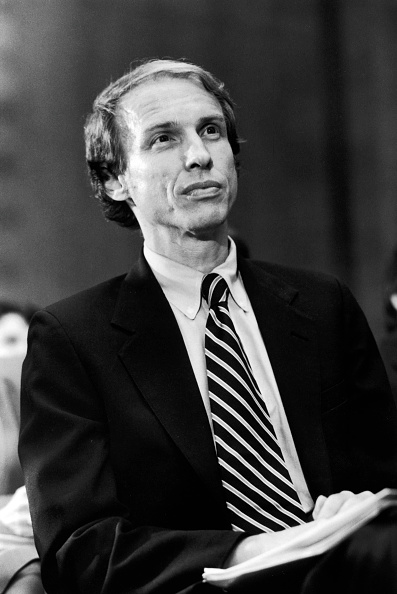Judiciary
Judge Explores Insurance Case’s Philosophical Implications in Notable Rulings
April 28, 2025, 3:07 pm CDT
Law professor and future federal judge J. Harvie Wilkinson III during his testimony in Washington, D.C., August 1994. (Photo by Cynthia Johnson/Getty Images)
In recent days, Judge J. Harvie Wilkinson III of the 4th U.S. Circuit Court of Appeals has captured attention with two striking opinions that blend legal rigor with philosophical reflection. On April 17, he criticized the Trump administration regarding due process violations in the deportation of an immigrant, Kilmar Armando Abrego Garcia, from Maryland, highlighting the profound implications of administrative errors in judicial practice.
Wilkinson’s ruling in Abrego Garcia v. Noem denounced the government’s actions to imprison residents in foreign locations without due process, marking a vital commentary on the intersection of law and human rights.
Shortly after, on April 23, he issued another notable opinion relating to an insurance dispute stemming from the tragic death of a man struck by an underinsured motorist while riding a lawn mower. In this case, Owners Insurance Co. v. Walsh, the court determined that the estate was entitled to $150,000 based on the terms of the insurance coverage.
In the latter opinion, Wilkinson ventured into what he described as “existential, metaphysical musings,” reflecting on the broader significance of seemingly mundane legal disputes:
“What after all does it matter? A single, seemingly ordinary, rather technical insurance case. One among the many hundreds of rulings judges make each year.
What does it matter? A case but a speck in the recesses of interstellar space and in the four-plus billion years since our solar system’s birth. What does it matter, this case deserted by both space and time?
To be human is to live in the here and now. This small case extracts courageous meaning from the vast impersonality in which it resides. Its immediacy confounds infinity; its passions light the dark. We have given it our best; the litigants have given it their best. The trial court has done the same. We do not overlook for a moment the tragic passing of the insured but neither can we ignore the contract under South Carolina law that defines the insurer’s obligation.”
The 80-year-old Wilkinson, a federal judge since appointed by President Ronald Reagan, has a reputation for his conservative rulings, often advocating for a broad interpretation of presidential power while objecting to decisions establishing abortion rights. His diverse background includes a stint as a law professor and service in the U.S. Department of Justice after an unsuccessful congressional campaign in 1970.
Wilkinson’s recent opinions reflect not only legal acumen but also a unique willingness to examine the philosophical dimensions of judicial decisions. His reflections prompt readers to consider the significance of each case within the expanse of time and human experience.

